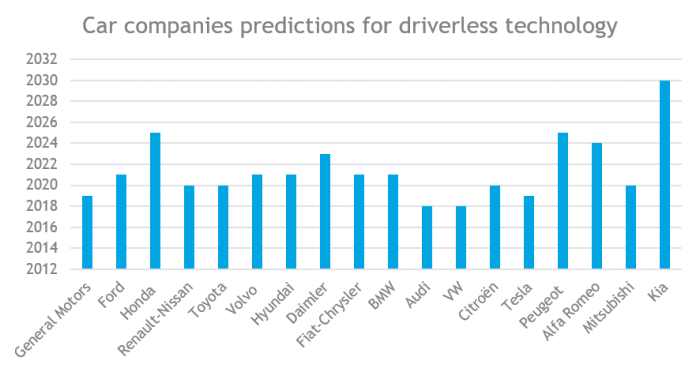July 30, 2018
Driverless vehicles will be on our roads within three years, claim industry experts
 Car companies, ride-hailing services and car industry technology suppliers each have their own prediction for when driverless cars will be ready to take to highways and city streets. Consultancy BDO has carried out a meta-analysis of a range of predictions and forecasts and concludes that autonomous vehicles will arrive in early 2021. There are some differences though, according to thh authors. Averaging out the predictions, car companies think that driverless technology will be ready around 2 am on June 11th, 2021. Ride-hailing services and technology suppliers are a bit more optimistic. They predict that autonomous car technology will be ready by midnight, March 14th, 2020.
Car companies, ride-hailing services and car industry technology suppliers each have their own prediction for when driverless cars will be ready to take to highways and city streets. Consultancy BDO has carried out a meta-analysis of a range of predictions and forecasts and concludes that autonomous vehicles will arrive in early 2021. There are some differences though, according to thh authors. Averaging out the predictions, car companies think that driverless technology will be ready around 2 am on June 11th, 2021. Ride-hailing services and technology suppliers are a bit more optimistic. They predict that autonomous car technology will be ready by midnight, March 14th, 2020.
The authors claim that people should be careful what they mean by the term ‘driverless’. It claims that the automobile industry routinely defers to the SAE International standard, which splits driverless into five categories. While it is far from all car companies that explicitly state what level of SAE driverless they are pursuing, BDO claims that most seem to be aiming for level 4. This is defined as ‘High Automation’. Essentially, at level 4 a driverless car can take appropriate action in many different driving situations – i.e. drive itself under many different circumstances.
At level 5, the car’s capabilities extend to: “[…]the full-time performance by an automated driving system of all aspects of the dynamic driving task under all roadway and environmental conditions that can be managed by a human driver.”
Legislation and rules are far from prepared
While the appropriate technology may be ready to go in three years, rules and regulations are still lagging somewhat behind, according to BDO. Issues include insurance (who is liable for a car that is driving itself?) – an issue highlighted by the Tesla crash earlier this year – what you will be paying to use vehicles, how companies can/will subscribe on behalf of their employees, as well as issues regarding taxation, bookkeeping and auditing.
Some of these issues become compounded by how different to ‘regular vehicles’ the new breed of cars will be. For example, the life-span of a driverless vehicle may be as low as a year.
BDO also raises issues regarding data security and sharing. Much of the data relating to transport in an autonomous car could be classified as personal data, putting it under the jurisdiction of data protection laws.
Getting to the date
Caveats outlined in the report: The data for the study comes from car companies, auto industry suppliers, ride-hailing services and experts. The predicted dates gathered come from the companies and experts themselves, from interviews with company C-level executives and other news sources. Some companies have specifically described what level of technology they are developing. Predictions from individual companies have changed over time. The cited predictions are considered to reflect their position in early 2018.
Image: Mercedes















